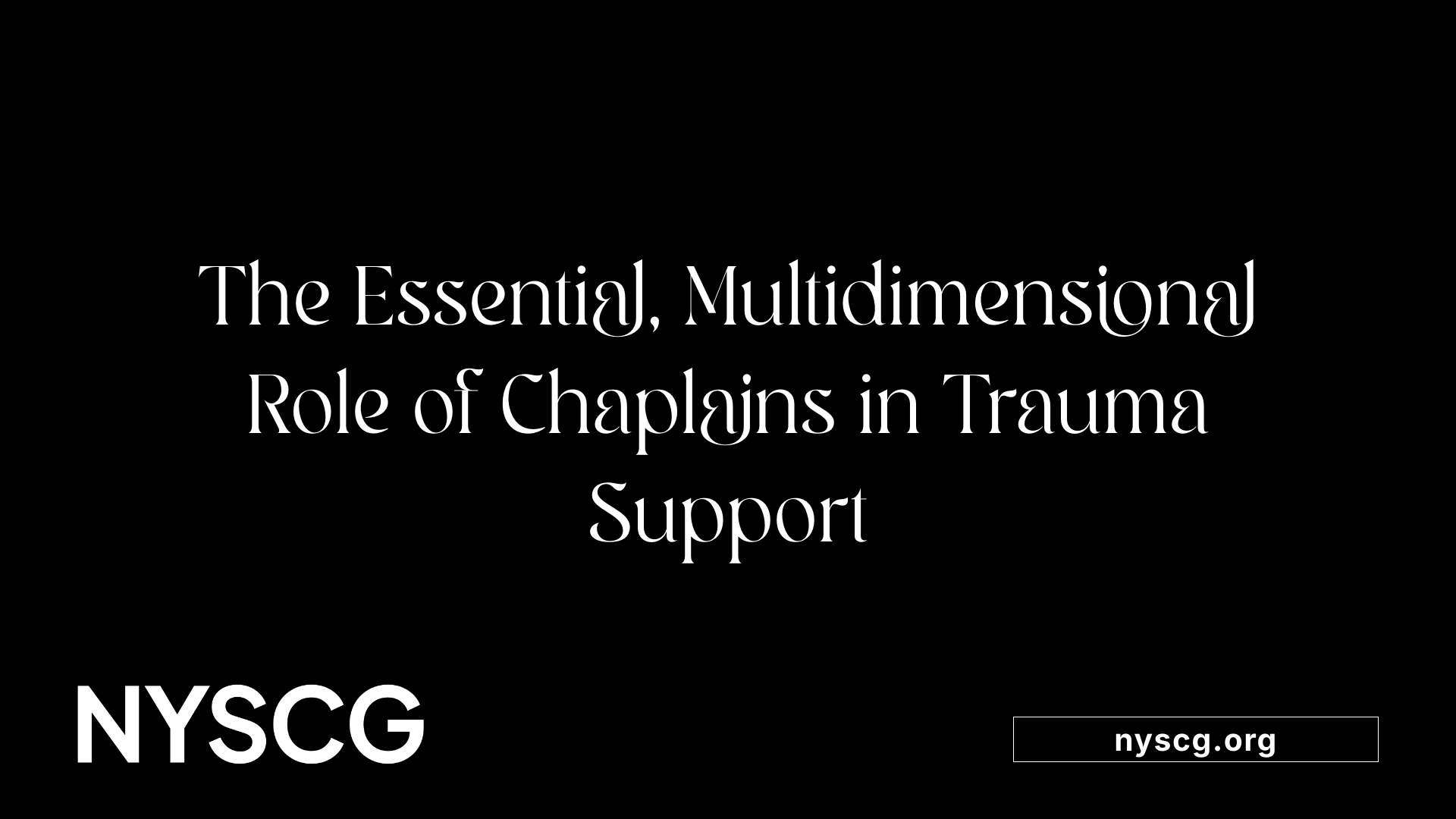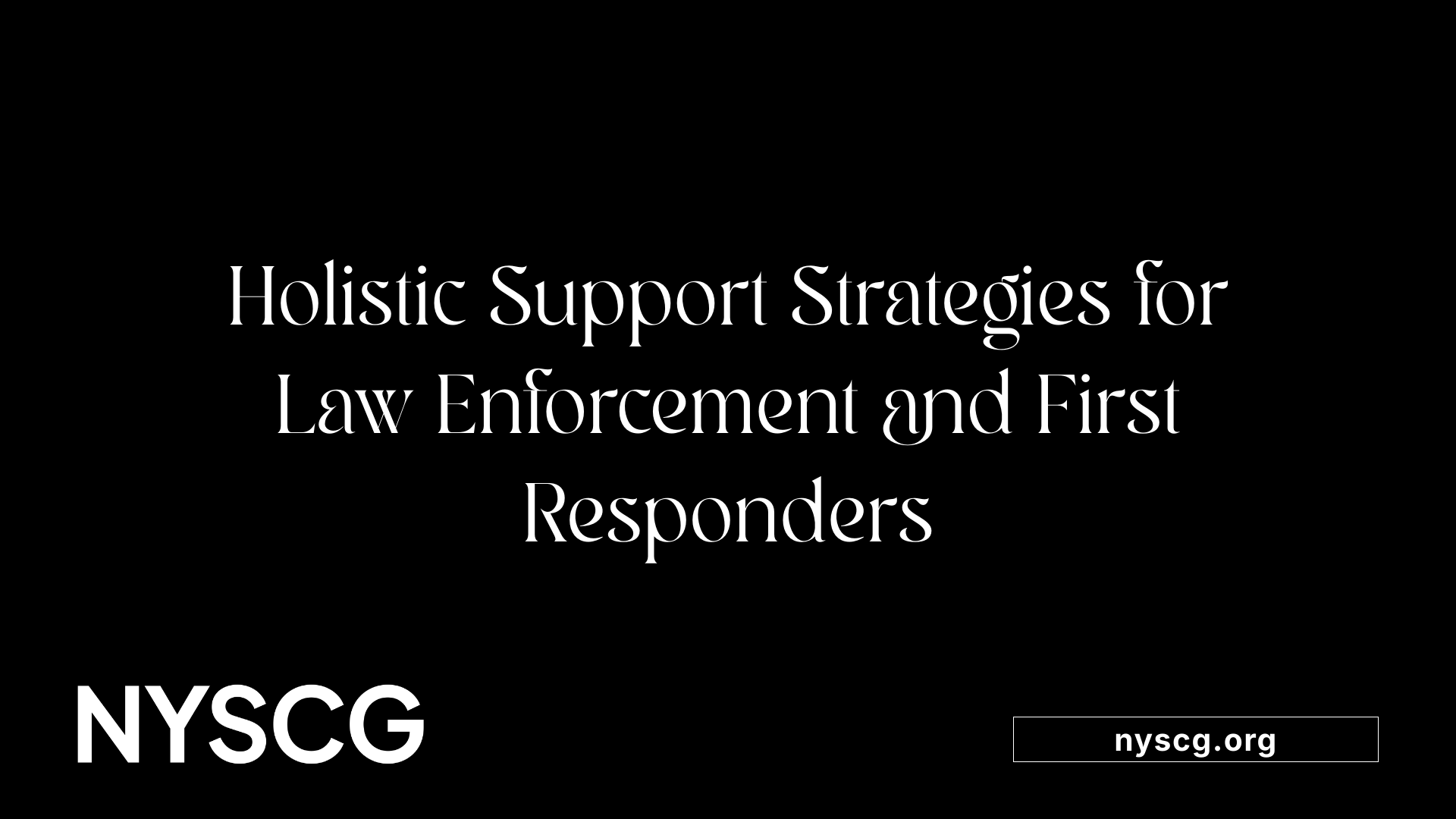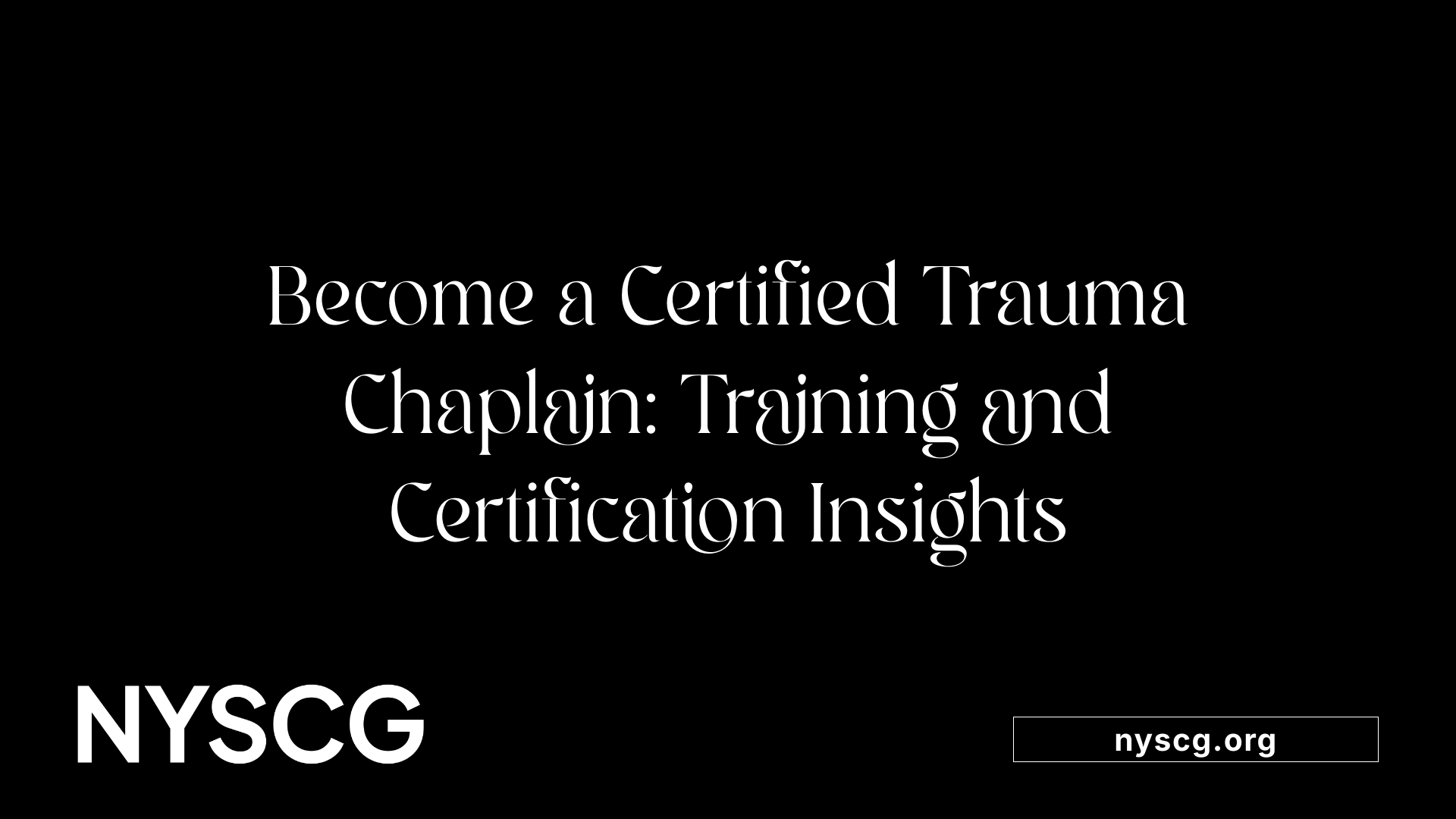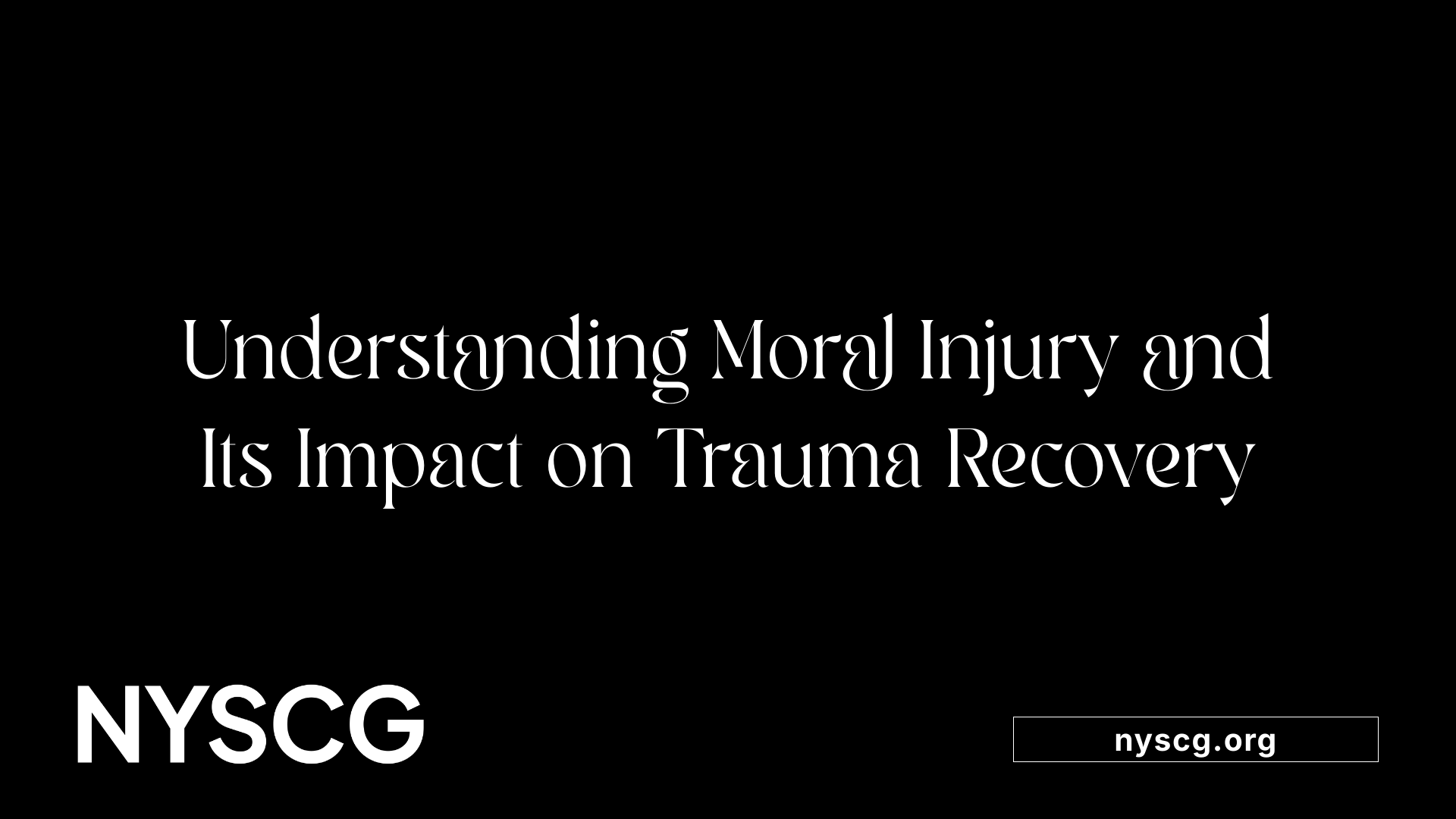The Chaplain’s Function in Post-Shooting Trauma Care


In the wake of shooting incidents, the trauma transcends physical injuries, touching the emotional, spiritual, and psychological fabric of victims, families, and responders. Chaplains serve as essential figures in this complex healing matrix, providing more than just spiritual comfort. Their responsibilities encompass a broad spectrum of support roles designed to foster resilience, aid in grief processing, and facilitate holistic recovery. This article explores the pivotal functions of chaplains in post-shooting trauma care, emphasizing their training, collaborative efforts, and the necessity of addressing mental health and moral injuries associated with such tragedies.

Chaplains serve as compassionate spiritual caregivers during and after mass shooting incidents, providing crucial emotional and spiritual support to victims, their families, and medical personnel. Their presence offers comfort amid chaos and helps individuals process profound grief and trauma.
One of their primary tasks is assisting in grief processing and loss. They help families and survivors articulate their feelings of sorrow, anger, and confusion. Through active listening and empathetic presence, chaplains facilitate emotional expression and provide reassurance that they are not alone during these difficult times.
Chaplains also play a key role in conducting religious rituals and ceremonies. When appropriate, they lead prayers, memorial services, or other spiritual practices that honor the victims and support the grieving process. These rituals help foster a sense of community and offer solace to those mourning.
In addition, chaplains act as mediators between patients, families, and healthcare teams. They help interpret medical information in a compassionate manner, ensuring that spiritual and emotional needs are considered alongside clinical treatment. By advocating for holistic care, chaplains help tailor support that respects individuals’ faith and cultural backgrounds.
Crisis intervention and stabilization are other critical functions. Chaplains assist in managing acute stress reactions, calming distressed individuals, and guiding both patients and staff through immediate emotional crises. They may also help coordinate ongoing mental health care, ensuring that trauma victims receive appropriate follow-up support.
Throughout these efforts, chaplains foster resilience and hope, empowering individuals to find meaning and strength in the aftermath of violence. Their multifaceted role is integral to a comprehensive trauma response, addressing spiritual wounds that often accompany physical injuries.
AspectRoleDescriptionProvision of spiritual and emotional supportOffer comfort and guidanceHelp victims and families cope with trauma and lossAssistance with grief and lossFacilitate grieving ritualsLead memorials, prayers, and remembrance servicesFacilitation of religious ritualsConduct ceremoniesSupport spiritual needs aligned with faith traditionsServing as intermediariesLiaise between patients, families, and medical staffClarify questions and advocate for spiritual concernsCrisis intervention and stabilizationImmediate emotional careSupport during acute distress and help re-establish calm

Chaplains serve as essential pillars of emotional and spiritual support for law enforcement officers and first responders who face traumatic incidents. Their presence offers a confidential space where officers can process their experiences, express their fears, and seek comfort without fear of judgment. By providing tailored spiritual care—including prayer, meditation, or faith-based services—they help responders find resilience amid chaos.
Beyond spiritual support, chaplains assist in managing stress and addressing moral injuries that may arise from difficult encounters, such as fatalities, critical incidents, or moral dilemmas experienced on the job. They also facilitate grief counseling and support officers in coping with loss, whether through death notifications or ongoing emotional challenges.
Chaplains are often involved in conducting death notifications with sensitivity and professionalism, guiding families and responders through the grieving process. They also help officers manage their emotional reactions to traumatic events, fostering mental health stability.
In addition to direct support, chaplains contribute to the development of resilience programs within law enforcement agencies. They deliver training to officers on trauma management, emotional regulation, and spiritual wellness. These programs aim to prepare officers for the emotional toll of their duties and enhance their capacity to cope.
A critical aspect of their role involves addressing moral injury and PTSD among responders. Chaplains help officers process moral conflicts and guilt that may impair their mental health or operational effectiveness.
By acting as trusted community liaisons, chaplains strengthen connections between law enforcement agencies and the communities they serve. They participate in community outreach, public ceremonies, and interagency collaborations, fostering trust and mutual understanding.
Chaplains’ integration into department culture through participation in training, orientation sessions, and public functions ensures ongoing support for officers and their families. This holistic approach promotes long-term resilience and mental wellness in first responders.
In summary, chaplains provide a comprehensive support system—combining emotional, spiritual, and moral guidance—that helps law enforcement officers and first responders navigate the psychological aftermath of their demanding work. Their role not only alleviates immediate distress but also builds a resilient foundation for enduring mental health in the face of trauma.

Becoming a trauma chaplain involves specialized education and practical experience tailored to address trauma, resilience, and holistic care. Accredited programs, such as the College of Clinical Care, offer comprehensive training that integrates evidence-based methods with a broad bio-psycho-social-spiritual approach. This curriculum emphasizes understanding trauma through the lens of salutogenesis (health promotion) and fortigenesis (building strength), equipping chaplains to support individuals navigating crises.
Certification for trauma chaplains typically entails completing about 400 hours of training. This includes around 100 hours of focused coursework covering trauma science, resilience strategies, and spiritual care. Additionally, candidates must complete approximately 300 hours of supervised practical experience, which involves real-world application of skills in clinical, community, or emergency settings.
The target group for these programs spans diverse professionals such as chaplains, mental health practitioners, first responders, social workers, and healthcare providers. This broad inclusion reflects the interdisciplinary nature of trauma response and spiritual care.
Furthermore, modern training methodologies leverage social media and online resources. These platforms facilitate ongoing education, peer support, and community engagement, enabling professionals to stay updated on best practices, share insights, and participate in virtual continuing education seminars.
AspectDetailsAdditional NotesAccredited ProgramsCollege of Clinical Care, othersOffer evidence-based curricula aimed at trauma and resilienceCertification Requirements~400 hours totalIncludes coursework and supervised practical experienceTarget ProfessionalsChaplains, mental health workers, first respondersPromotes interdisciplinary collaborationTraining MethodsIn-person, online courses, social mediaEnsures accessibility and community building
This structured training ensures trauma chaplains are well-prepared to address complex emotional and spiritual needs, providing holistic support to individuals affected by trauma.

Moral injury is a trauma-related syndrome resulting from actions or experiences that deeply violate an individual’s moral or ethical beliefs. Unlike physical injuries or conventional trauma, moral injury impacts the 'soul,' creating wounds that are often difficult to heal. It arises when a person perceives having committed, witnessed, or failed to prevent actions that clash with their moral compass.
Core symptoms of moral injury include intense feelings of shame, guilt, loss of trust, and spiritual conflict. These emotional responses can lead to secondary issues such as depression, anxiety, anger, social alienation, and even self-harm. Recognizing these symptoms is vital for effective interventions.
Chaplains are uniquely positioned to support individuals suffering from moral injury. They can assist in the initial screening process by utilizing assessment tools such as the Spiritual Injury Scale and the Moral Injury Events Scale. These instruments help identify the severity and nature of moral wounds, facilitating targeted care.
Beyond screening, chaplains employ various spiritually focused interventions to aid healing. One such approach is the Pastoral Narrative Disclosure (PND), a structured eight-stage process designed to guide individuals through exploring their morally injurious experiences. PND involves establishing rapport, reflection, reviewing the event, reconstruction, healing rituals, renewal, and reconnecting with community.
The PND process helps individuals examine their experiences, address feelings of guilt or shame, seek forgiveness, and find a sense of reconciliation. It encourages a person to articulate their story in a safe, confidential space, promoting understanding and emotional release.
Chaplaincy research and practice increasingly emphasize a holistic approach—integrating biological, psychological, social, and spiritual aspects—to address moral injury. By focusing on spiritual and moral wounds, chaplains help individuals find meaning and regain trust, supporting recovery from deep internal conflicts.
A comprehensive scoping review examined 482 references related to moral injury, spirituality, and chaplaincy, with 60 of these specifically emphasizing the chaplain’s role. Most sources viewed chaplains positively in addressing mental health and moral wounds, framing their role as critical in fostering spiritual resilience.
The World Health Organization's ICD-10-AM framework has been used to categorize interventions and roles for chaplains, emphasizing their importance within multidisciplinary mental health care.
Further research is needed to refine and evaluate chaplaincy interventions for moral injury. Integrating chaplaincy care with mental health services and ongoing assessment can enhance support for those affected by morally injurious experiences. This collaborative, holistic effort aims to heal profound spiritual and moral injuries, helping individuals rebuild their lives with renewed trust, purpose, and spiritual vitality.
Effective trauma interventions increasingly recognize the importance of a holistic approach that combines biological, psychological, social, and spiritual elements. Chaplains play a crucial role in integrating these domains, addressing not just the physical and mental health of individuals but also their spiritual well-being. For example, spiritual care can help foster resilience and posttraumatic growth, while social support networks aid recovery. The World Health Organization’s ICD-10-AM framework is often used to guide these comprehensive strategies, which facilitate personalized and culturally sensitive care.
Guilt is a common and distressing symptom among trauma survivors and can lead to or exacerbate other mental health issues. Traumatized individuals, including military personnel and emergency responders, frequently grapple with feelings of shame and moral injury—particularly when they perceive themselves as having violated personal or moral principles. Trauma-informed guilt reduction therapy employs techniques such as narrative therapy and cognitive-behavioral approaches to help individuals process guilt, explore moral conflicts, and find pathways toward forgiveness and acceptance. These methods aim to reduce shame, promote emotional healing, and support moral reconciliation.
Mindfulness and meditation practices are increasingly integrated into trauma care, with proven benefits in reducing stress and promoting emotional stability. Compassion-based meditation fosters self-compassion and empathy toward others, which can counteract feelings of anger, shame, or alienation often experienced after trauma. The Mantram Repetition Program involves repeating a calming word or phrase to help maintain focus, reduce anxiety, and build inner resilience. Both practices are simple yet powerful tools that chaplains can incorporate into their interventions, helping individuals reconnect with their inner resources and spiritual traditions.
For optimal trauma recovery, chaplains often work alongside mental health professionals, creating a multidisciplinary team that addresses the complex needs of trauma survivors. This collaboration enhances the screening, assessment, and treatment processes, especially for issues like moral injury and PTSD. Chaplains are uniquely positioned to provide confidential, holistic spiritual care, while mental health providers focus on clinical interventions. Together, they can develop comprehensive care plans that include spiritual assessment, counseling, and community support. This partnership is vital in ensuring no aspect of a person’s well-being is overlooked and that they receive empathetic, culturally appropriate support.
StrategyDescriptionExample/ImplementationBio-psycho-social-spiritualIntegrates multiple domains for holistic healingUsing WHO frameworks, personalized care plans are created to address diverse needsGuilt reductionFocuses on processing moral injuries and shameNarrative therapy sessions exploring guilt and forgivenessMeditation & MantramUses mindfulness and repetition to reduce stressGuided compassion meditation and repetitive phrases like 'peace'CollaborationMultidisciplinary approach involving spiritual and mental healthTeams of chaplains and psychologists working together on case management
Spirituality and religious practices play a significant role in how individuals recover from trauma. Positive religious coping methods, such as prayer, community support through faith groups, and spiritual reflection, are associated with better mental health outcomes and facilitate posttraumatic growth. These approaches help individuals find meaning, purpose, and a renewed sense of hope after experiencing traumatic events. For example, engagement in spiritual activities can foster resilience by offering comfort, strengthening social bonds within faith communities, and providing a moral framework to interpret challenging experiences.
Research indicates that people who utilize positive religious coping mechanisms often report lower levels of stress, depression, and anxiety. They are also more likely to experience personal transformation and a renewed sense of purpose. Ultimately, spirituality can serve as a vital resource in navigating the complex emotional landscape of trauma recovery, supporting both mental health and spiritual well-being.
While spirituality can aid recovery, it can also present difficulties. Trauma may trigger spiritual struggles such as feelings of anger towards a higher power, moral injury, guilt, or doubts about faith. Many survivors grapple with questions of divine justice or forgiveness, especially when faced with loss or perceived moral transgressions committed during the trauma.
Common spiritual challenges include guilt over survivor's remorse, moral injury involving guilt and shame, and difficulties with forgiveness—either seeking it from others or forgiving oneself. These struggles can intensify emotional distress and hinder healing if not addressed.
Healthcare providers and chaplains recognize the importance of acknowledging these spiritual conflicts. Facilitating processes of forgiveness, spiritual reconciliation, or faith-based reflection can support individuals in overcoming these barriers, promoting healing of both the spirit and the mind.
Incorporating spirituality into treatments for PTSD and other trauma-related conditions recognizes the holistic nature of healing. This integration may involve assessment of spiritual beliefs and practices, spiritual-focused therapies, or collaboration with chaplains and faith leaders.
Various therapeutic approaches include trauma-informed guilt reduction therapy, compassion-based meditation, and the Mantram Repetition Program, all of which incorporate spiritual elements to address moral injury and promote resilience.
Professional guidelines emphasize that spiritual interventions should be tailored to individual beliefs and coordinated with mental health strategies to ensure ethical and culturally sensitive care. The goal is to support meaningful recovery that aligns with patients' spiritual values.
Effective trauma care often starts with understanding the patient’s spiritual background. Healthcare providers are encouraged to assess spiritual beliefs, religious practices, and coping mechanisms as part of comprehensive treatment planning.
Tools such as spiritual assessment questionnaires and spiritual screening protocols help identify spiritual strengths and struggles. When appropriate, referrals to chaplains or spiritual counselors can enhance the therapeutic process.
Strengthening the integration of spiritual care involves training mental health professionals in spiritual assessment, establishing collaborations with chaplains, and ensuring that spiritual needs are respected within the context of evidence-based treatments. This approach aims to facilitate posttraumatic growth and long-term resilience.
Hospitals and trauma centers increasingly recognize the importance of addressing spiritual needs post-disaster or mass casualty incidents. Chaplains assist in screening and providing spiritual support to both patients and staff, helping them cope with their emotional and spiritual reactions.
For instance, after mass shootings or terrorist attacks, trauma staff are supported through debriefings, counseling, and spiritual care interventions coordinated by chaplains. These efforts help reduce burnout, compassion fatigue, and symptoms of burnout among healthcare providers and responders.
The inclusion of spiritual care in trauma response emphasizes a holistic approach, acknowledging that recovery encompasses physical, emotional, social, and spiritual domains. This comprehensive care model fosters resilience in individuals and communities during their healing journey.
AspectDescriptionAdditional NotesPositive religious copingUsing faith-based strategies for resilienceAssociated with growth and well-beingSpiritual strugglesGuilt, anger, doubts, moral injuryCan hinder recovery if unaddressedIntegrating spirituality in therapyCollaboration and spiritual interventionsEnhances holistic healingSpiritual assessment toolsScreening for beliefs and needsFacilitates personalized careHealthcare supportChaplains assist during crisisSupports staff and patient recovery
Understanding the interconnected roles of spirituality, mental health, and trauma treatment highlights the importance of a comprehensive, compassionate approach. Both mental health providers and spiritual care professionals are essential in guiding trauma survivors through their complex recovery processes, ultimately fostering resilience, forgiveness, and renewed hope.
Mass shootings place immense physical and emotional demands on healthcare providers. Medical teams at emergency rooms often operate under chaos and high stress, treating victims with severe injuries such as gunshot wounds to the head, chest, or abdomen. These situations expose healthcare workers to traumatic sights and experiences that can lead to psychological distress, including symptoms akin to post-traumatic stress disorder (PTSD). Many respond rapidly to save lives, but the emotional toll can persist long after the immediate crisis has passed.
Providers like doctors, nurses, and emergency responders may experience feelings of helplessness, grief, and trauma. Witnessing the suffering of victims, especially children or close community members, can ignite secondary trauma, affecting their mental well-being. Response efforts are physically demanding and emotionally draining, often leading to fatigue, compassion fatigue, and in some cases, the development of PTSD.
Following a mass shooting, mental health support becomes essential for healthcare workers and responders. Hospitals and emergency services implement structured debriefings and counseling sessions, often involving chaplains and mental health professionals, to help staff process their experiences. These interventions aim to reduce feelings of guilt, sadness, and anxiety.
Similarly, community-based support initiatives extend aid beyond the immediate medical response. Support groups, crisis hotlines, and psychological counseling are organized to address ongoing emotional needs. Recognizing that trauma can have lasting effects, many institutions encourage ongoing therapy and peer support programs.
Community engagement plays a crucial role in recovery. Blood donation drives, memorial services, and public messages of solidarity help foster collective healing. Community organizations often collaborate with local health services to provide emotional support and resilience-building activities.
These initiatives serve multiple purposes: they honor victims, support survivors, and mobilize community resources. Educational campaigns may focus on trauma awareness and mental health literacy, enabling community members and healthcare workers to seek help when needed.
Responding to mass shootings can profoundly impact healthcare professionals' perspectives. Many report increased empathy, a heightened awareness of gun violence’s devastating effects, and a stronger commitment to activism against such tragedies. Personal experience with mass shooting aftermath often motivates medical personnel to advocate for policy changes, donate to related causes, and participate in community outreach.
Furthermore, healthcare workers develop greater sensitivity to the needs of trauma victims and their families, fostering a more compassionate approach in their practice. While some face emotional exhaustion, others transform their response into activism, aiming to reduce future violence and improve mental health support systems.
AspectDescriptionAdditional NotesTrauma impact on healthcare workersExposure to severe injuries, emotional distressCan lead to PTSD, compassion fatigueSupport strategiesDebriefings, counseling, peer groupsEssential for recoveryCommunity supportBlood drives, memorials, mental health campaignsPromote collective healingProfessional growthIncreased empathy, activismDrive for policy change
Understanding the profound effects of mass shootings on healthcare providers and communities highlights the importance of comprehensive support systems, preparedness, and resilience-building measures. Ensuring mental health resources, fostering community solidarity, and encouraging advocacy are crucial in healing both individuals and society after such tragedies.
Chaplains and emergency responders face continual exposure to trauma and distressing situations, making self-care essential for maintaining mental health and resilience. Regular physical activity, such as walking, running, or yoga, helps alleviate stress, improve mood, and promote overall well-being. Relaxation techniques like deep breathing exercises, progressive muscle relaxation, and guided imagery are practical tools to manage acute stress responses.
Mindfulness practices, including meditation and focused breathing, enable responders to stay present and reduce feelings of overwhelm. These practices foster emotional regulation and help prevent burnout. Incorporating a daily routine of mindfulness can significantly improve emotional stability and clarity during high-pressure situations.
In today’s digital age, constant media consumption related to traumatic events can intensify feelings of helplessness, fear, and grief. For chaplains and responders, limiting exposure to news about tragedies helps manage emotional overload and reduce secondary traumatic stress.
Setting boundaries around media intake involves turning off news alerts, avoiding graphic images online, and focusing on constructive activities. Practicing selective exposure ensures that responders can stay informed while safeguarding their emotional health. This approach helps prevent the accumulation of vicarious trauma and supports sustained mental resilience.
Peer support plays a vital role in the mental health of chaplains and responders. Sharing experiences within a trusted community provides validation, reduces feelings of isolation, and fosters mutual understanding. Formal peer support programs, group debriefings, and peer-led discussions create safe spaces to process difficult emotions.
Seeking professional help is equally important. Mental health services, including therapy and counseling, offer specialized strategies to cope with trauma and grief. Confidential consultations with psychologists, psychiatrists, or chaplains trained in trauma can address symptoms of PTSD, depression, and anxiety. Recognizing the need for help and reducing stigma around mental health fosters a culture of openness and resilience.
Spiritual support is a cornerstone of resilience for many chaplains and responders. Faith communities, spiritual practices, and personal belief systems provide comfort, hope, and a sense of purpose during crises. Engaging in prayer, meditation, or spiritual reflection can strengthen inner resources.
Social connections with colleagues, friends, and family are equally crucial. Maintaining strong relationships offers opportunities for emotional sharing and practical support. Participating in community activities, religious services, or support groups enhances social bonds and fosters a sense of belonging.
By integrating spiritual and social support frameworks into daily routines, responders bolster their capacity to handle stress, recover from trauma, and sustain their dedication to helping others.
Self-Care StrategiesPractices IncludedBenefitsExerciseWalking, yoga, sportsReduces stress, boosts moodRelaxation TechniquesBreathing exercises, progressive muscle relaxationAlleviates anxiety, calms mindMindfulness PracticeMeditation, focused breathingImproves emotional regulationMedia LimitationTurning off news, avoiding graphic contentPrevents vicarious traumaPeer SupportGroup debriefings, peer counselingFosters validation, reduces isolationProfessional HelpTherapy, counseling sessionsTargets trauma, depression, PTSDSpiritual SupportPrayer, meditation, religious servicesReinforces hope, purposeSocial ConnectionsFamily, friends, community groupsBuilds resilience, provides comfort
Building resilience is an ongoing process. Combining physical, emotional, spiritual, and social strategies creates a robust foundation for healthcare workers and chaplains. Sustained self-care not only benefits individual well-being but enhances the overall strength of response teams and communities in times of crisis.
Chaplains serve as the vital bridge in post-shooting trauma care, integrating spiritual, emotional, and psychological support to promote holistic healing. Their specialized training, community engagement, and compassionate presence help victims, families, and responders navigate the turbulent aftermath of mass violence. Recognizing the importance of mental health resilience, especially regarding issues like moral injury and PTSD, underscores the need for ongoing research, professional development, and institutional support for chaplains. As frontline spiritual first-responders, their contributions extend beyond immediate crisis management to long-term community recovery, emphasizing the profound connection between faith, resilience, and healing.
All you need is the will to make the world a better place.
New York State chaplain group inc. is a tax deductible organization with a federal tax Id number 92-383-4921